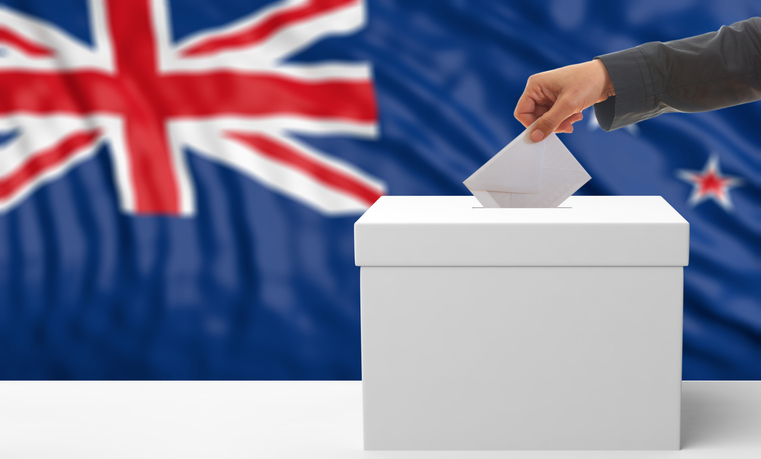Should all voters be required to have a formal digital (RealMe) identity.
A far greater degree of voter engagement would be possible if all registered voters have a REALME identity. RealMe® is a secure login service based on a verified digital ID that lets people access online services from government departments using a single username and password. Real Me Link….
Some voters may not want to have a formal online identity verified by central government however the benefits are significant in terms of accessing many government agencies such as ACC, IRD and Work and Income. It does not result in government holding any additional information about an individual voter, but it does make conducting business with government departments far easier.
If every voter has a REALMe identity, then this verified identity can be used for a wide range of online activities related to a greater degree of direct democracy. The principal issue with democracy at present is one of a lack of voter engagement. A digital identity for each voter will allow a far greater degree of interaction between the voters and the elected representatives.
In particular, it could allow direct voter participation in the formulation of laws and regulations. Imagine if contentious parliamentary initiatives such as the replacement of the Resource Management Act or the Regulatory Standards Bill were put to a public vote. Perhaps all legislation should be subject to a popular vote if a certain percentage (say 10%) of registered voters required this to be done. Maybe all draft legislation should be subject to a process whereby it automatically includes a function that allows for the legislation to be put to the popular vote if a certain percentage of the population requests that this occurs.
If all voters have a verified digital identity, then such a process would not be expensive or time consuming. There is no reason why this process could not be as simple as an App on a smart phone. Our phones have become a virtual identity and wallet already, adding a voting function and Realme identity to everyone’s phone won’t make any difference to the data governments and corporations glean from your phone but it would make participation in the democratic process hugely more accessible.
Not every citizen may wish to participate but maybe that should be accepted. The key objective needs to be to get as many voters engaged as practically possible. Individuals that object to or prefer not to engage make a personal decision that should be respected but they will miss out on the opportunity to engage in the democratic process. A minority not engaging will not undermine the benefits of a far greater degree of engagement from the majority of the population.
Public facilities should be established to allow those who are impeded through poverty, physical limitations, or lack of access to or familiarity with technology to participate in this process. These same populations will also need this access and assistance for other interactions with government and banking services.
Feel free to Vote below and / or go to the full list of questions – The Key Questions
-
No+ 35%, 7 votes7 votes 35%7 votes - 35% of all votes
-
Neutral 30%, 6 votes6 votes 30%6 votes - 30% of all votes
-
Yes+ 15%, 3 votes3 votes 15%3 votes - 15% of all votes
-
No- 15%, 3 votes3 votes 15%3 votes - 15% of all votes
-
Yes- 5%, 1 vote1 vote 5%1 vote - 5% of all votes
Each question is seeking a response on a range through “yes+” “yes-“ “neutral” “no-“ “no+” where the plus indicates strong support minus indicates mild support.
5 Comments
Submit a Comment
Footnotes: This idea has been considered by the present Justice Committee along with 64 others. Date: 8 April 2025
Government accepts election process changes ““We plan to implement 23 either in full or in part, through an electoral amendment bill to be announced later this year.” There is a list of 65 recommendations in all that can be downloaded as a PDF.
Table One – Recommendations that the Government intends to address via an upcoming electoral amendment bill, where practicable Item Number 40 on the list is this.
“Consider a longer-term legislative modernisation programme, which will require funding to provide for additional flexibility, or conditions in which electronic means are allowed, including:
• allowing an enrolment update to be made for an existing elector following a data match, with either postal or electronic confirmation (for example, a change of address)
• allowing electronic confirmation for a new enrolment, including any conditions (for example, requiring enrolment to be done online and verified using RealMe, a driver licence, or a passport)
• allowing a new enrolment to be actioned automatically following a data match that identifies a person as not enrolled, with either postal or electronic confirmation sent to the elector and clarifying how the Māori Electoral Option provisions would apply in this situation
• enabling alternative forms of enrolment inquiry to be undertaken by digital means, such as email
• amending the data-matching provisions in section 263B of the Electoral Act to allow the Electoral Commission to receive email and phone numbers to enable electronic communications to encourage enrolment
• allowing electronic confirmation for any update of an existing elector’s enrolment record completed online or in writing
• allowing overseas electors to be sent electronic correspondence for enrolment update campaigns, to confirm a new enrolment, or for an enrolment update
• for integrity reasons, requiring electors who live overseas to re-enrol every three years (for New Zealand citizens) or every 12 months (for New Zealand permanent residents)
• improving the scope for information-sharing to update enrolment details
• allowing an individual to be automatically enrolled at birth or upon gaining residency or citizenship
• exploring allowing the use of Inland Revenue and other government data as an automatic enrolment tool.”
Join Us in the Journey

Get Involved
- Vote & / or comment) on key questions.
- Subscribe to the mailing list.
- Read the blog posts & comment
- Improve local body systems
- Sign the petition. We are reviewing the best options to make this online. TBA

I am cautious about enforcing digital identities on everyone, as the digital world is clearly becoming a very dangerous space. Could we really be sure of its security and privacy if Realme ended up under the control of someone like Elon Musk – who (for a while) appeared to have no problem accessing the records of just about every US government department?
Yes, I’m cautious too. And while the arguments presented for this are good, they are maybe more based on a view of a middle-class, sorted out, more entitled population who all have good smart phones, have the foundational documents on which Real Me is BASED (e.g. drivers licence, current passport, etc) and are able to get to some office and stand in a queue for 3 hours to get the flipping thing.
And while these caveats seem to be resolved through the proposal that ‘public facilities should be established’ to address them, I can’t imagine how this would be done.
I find it chilling to entertain the notion that you need to flash a specific card in order to participate in a democracy. I know that currently a lot of people are excluded because of lack of fixed address and so on. There absolutely needs to be some way that everyone can enrol, but I don’t think RealMe would be any more inclusive. It could be that a much wider range of ID than passports and current drivers’ licences are normalised. For example, a Supergold card, even a Visa card. Both imply that a lot of trust is placed in the holder, after all. It’s a condundrum that needs more thought to resolve, including a hard look at the actual risks (e.g. of voter fraud, benefit fraud or whatever) that loosening up the notion of proving your ID seeks to avoid.
Hi Susie
Agree that any existing secure ID should be able to be used for voter ID – there is no way around having something like this underpinning the voting process – RealMe is more a shorthand for getting some form of online democracy going that is simple – such that the process of voters interacting with the democratic process is much enhanced – even your cell phone can be used as an ID now as most are pin or fingerprint/face recognition secured so a voter app could be used for a lot of democratic interactions. It is getting to be a rarer thing where most individuals don’t have cell phones a computer isn’t necessary to participate. Maybe Govt could provide basic phones that are secure to people on pensions/benefits as part of the social payment system. Your comments are the sort of discussion this site is seeking to assist in development of a final position for the petition on each of the questions.
I know quite a few people who still don’t have a mobile phone, or if they do, it isn’t a smart phone. Many people are functionally illiterate and would find navigating the RealMe website a problem. Many people might spend hours at a time on their phone but still have problems dealing with anything more complex than Facebook or YouTube. More than a few elderly people have issues remembering passwords and struggle with apps that time out for security reasons. More than a few people don’t have driving licences, or passports or bank accounts or …
I have a RealMe account, but I wouldn’t want to have it imposed on me so that I can vote. Universal suffrage should not depend on Google or Yahoo or Hotmail, and RealMe communicates via email. Most people use these unreliable and uncontrollable players to provide them with email (myself included). Making an online presence mandatory is going to alienate the many people who are not unreasonably somewhat paranoid about such things.
I do agree that the Internet can bring many opportunities for people to get involved in poltics – look at this site! – but those who want to distance themselves from technology, or find it hard to deal with, should not end up disenfranchised.
The voting process from registration onwards should be as simple as possible so that it is as inclusive as possible. I wonder whether we should have compulsory voting, as the proportion of registered voters in many national and local elections is dismal; more so in local elections, if I understand correctly. At least increased turn-out would more ably take the nation’s pulse! In my opinion, requiring yet another form of electronic registration at this stage will hinder many potential voters. It might be more feasible in the future as RealMe becomes more widely utilised by NZers, but I suspect many citizens are not yet using it, although I have no data about that. Does anybody know roughly what percentage of NZ citizens (potential eligible voters) are RealMe users?